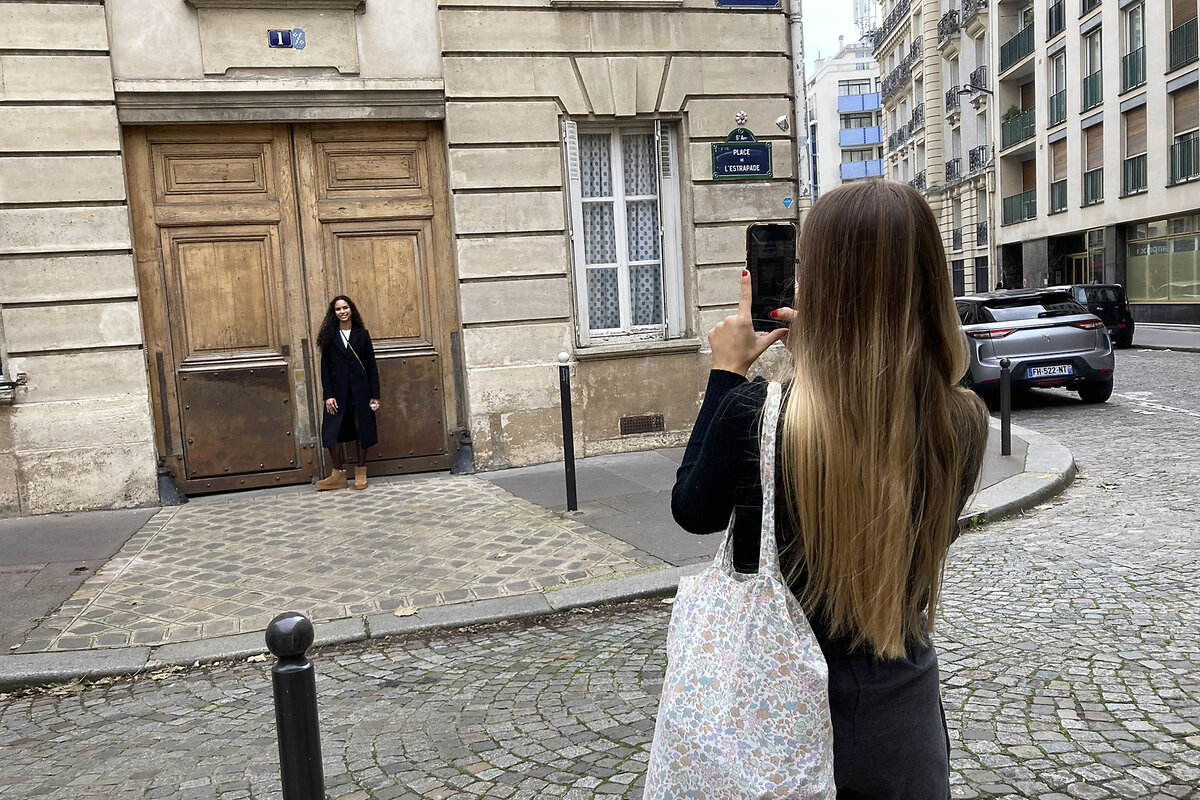The French love to hate ‘Emily in Paris.’ But they won’t let her leave.
Loading...
| Paris
I’d never seen so many red berets in my life. But there they were: five young tourists, all wearing the iconic French hat on a blustery October day. Cellphone cameras at the ready, they stood, one by one, not at the Eiffel Tower or the Pantheon a few steps away, but in front of a basic brown door at 1 Place de l’Estrapade.
But this isn’t just any door. This is where “Emily in Paris” lives.
Now in its fourth season, the hit Netflix show features Emily Cooper (played by Lily Collins), an overly enthusiastic, workaholic Chicago native who lands her dream job at a Paris-based marketing firm.
Why We Wrote This
“Emily in Paris,” the Netflix hit series, skewers French foibles and mines antiquated French stereotypes. And the French cannot get enough of it – especially now that there is talk of Emily moving to Rome.
Through her epic cultural fails, viewers get a dose not only of the myriad ways in which American tourists offend Parisians, but also of every antiquated stereotype about the French that producer Darren Star (of “Sex and the City” fame) could dredge up: All the men cheat on their partners, the boss smokes in her office, and everyone gorges themselves on croissants and still manages to stay bone-thin.
The French can’t get enough of it.
“I’ve watched the entire series even if it’s not highbrow,” says Agathe, a Parisian who works at Universal Music next door to the restaurant where many of the “Emily in Paris” scenes are filmed. (Like others interviewed, Agathe asked to be identified by her first name only.) “It’s a guilty pleasure.”
Agathe is not alone. After five episodes of its latest season, “Emily in Paris” became the most-watched show in France. Even French President Emmanuel Macron is a fan, after his wife, Brigitte, made a cameo appearance in Episode 7.
But now, there’s a chance that Emily will say “arrivederci” to Paris, after her marketing firm decided at the end of the fourth season to open a branch in Rome. That has French fans of the love-to-hate series, and even Mr. Macron himself, up in arms.
“We will fight hard. And we will ask them to remain in Paris!” Mr. Macron told Variety magazine in a recent interview. “‘Emily in Paris’ in Rome doesn‘t make sense.”
Indeed, it is largely thanks to Americans’ deeply rooted vision of France that “Emily in Paris” has been such a success. Even if they fantasize about Italy – think Julia Roberts languishing over a plate of pasta in “Eat Pray Love” – they fantasize about France more. The country has been the world’s top tourist destination for three decades, and France’s capital is the key to its soft power.
“France’s cultural power is ingrained in the French from an early age,” says Fabrice Raffin, a socioanthropologist who studies culture at the University of Picardie. “Our gastronomy, luxury, fashion, and history are pillars of French identity. There’s definitely something elitist about it.”
So while the French may be screaming at their television screens as they watch Emily attend yet another glamorous cocktail party without ever stepping foot in a smelly metro car, they can’t help but admit to getting sucked into Emily’s idealistic view of the city.
“Paris is amazing, and the show highlights the best parts of it,” says Elsa, joining Agathe outside their office. “On Sundays, I like to go around the city, visit the Eiffel Tower, and be a tourist.”
Plus, many French viewers say that, even if the stereotypes about them in “Emily in Paris” seem to date back to the Middle Ages, they’re still hilariously true.
“It’s obviously an exaggeration, but yes, the French love to complain, and we pretend to be anti-American like [Emily’s boss], Sylvie,” says Anis, taking a (stereotypically French) cigarette break with co-workers Agathe and Elsa. “The stereotypes are funny.”
As much as Emily makes us cringe, from her outrageous, wannabe-chic outfits to her obsession with getting Instagram likes, here’s hoping she decides to stay in the land of cheese and subpar coffee (Emily’s French co-worker said it, not me). The mayor of Rome, Roberto Gualtieri, told Mr. Macron over the social platform X to “relax” and focus on “more pressing issues.” Even some Italians are not convinced by her potential move.
“No, no, it has to stay here,” says Matilde Mudadu, a tourist from the north of Italy, who came with her parents to take a photo in front of Emily’s famous door. “I love Rome, but ‘Emily in Paris’ was born here and it has to stay here.”
The French might be sad if Emily leaves, but Americans in Paris wouldn’t shed any tears; many of them have had enough of the Chicago native’s absent-minded cultural blunders.
“French people assume you came here for the fantasy or the croissants, and it’s refreshing to them when they hear otherwise,” says Emily Omier, an American tech consultant who moved to Paris in May 2023. “I don’t know if the jokes will stop if Emily leaves Paris. Now, every conversation is the same: ‘Oh, your name is Emily? Like “Emily in Paris”!’ I just say, ‘Yeah, it’s me.’”







